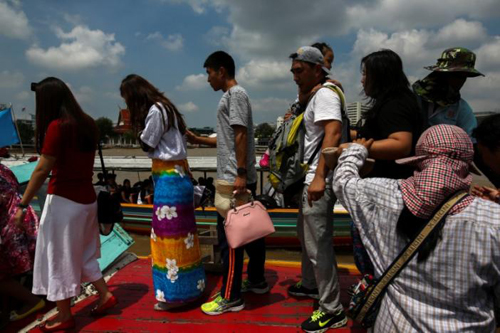According to the Tourism Council, Thailand's tourist arrivals are forecast to rise between 3.75 percent to 5.8 percent next year.
Chinese tourists board a sightseeing boat at a pier at
Chao Phraya River in Bangkok, Thailand, October 3, 2016.
Thailand's tourist arrivals are forecast to rise between 3.75 percent to 5.8 percent next year, the Tourism Council said on Wednesday, driven largely by Chinese visitors.
Thailand's tourism industry, which accounts for about 10 percent of gross domestic product, has remained strong despite more than a decade of political turbulence including military coups in 2006 and 2014.
A wave of deadly bombings in August in key resort towns that killed four Thai tourists and injured dozens, including foreigners, has had a negligible impact on tourist arrivals.
Budget-friendly Thailand expects up to 34.4 million tourists in 2017, council president Ittirit Kinglek told Reuters.
A crackdown earlier this year on cheap tour packages for Chinese tourists - known as "zero dollar tours" - has also failed to dent tourist arrivals, he said.
"Chartered flights from various Chinese cities declined afterwards for a short period but they are now back again. It's an encouraging sign. We may see a decline in tourist arrivals in the first quarter but by the second quarter things will improve," Ittirit said.
The tourism ministry has said it expects a record 32.4 million visitors this year.
The council forecasts about 9.17 million Chinese arrivals next year, up from 8.9 million in 2016.
Tourism has been a rare bright spot for Southeast Asia's second-largest economy, which has been dragged by sluggish exports and domestic demand since the military took power in a May 2014 coup.
Thailand's centuries old exotic allure, its array of beaches and gilded Buddhist temples have ensured that the country remains one of the world's top travel destinations.
Data for advance flight bookings to Thailand made between Dec. 31 to Jan. 3 showed a 40 percent increase in bookings from North and South America, the council said, followed by a 4 percent increase from the previous year in bookings from Europe.
Thailand is marking a year-long period of mourning for late King Bhumibol Adulyadej who died on Oct. 13.
Despite the mourning period, the military government has stressed that business should continue as normal.
